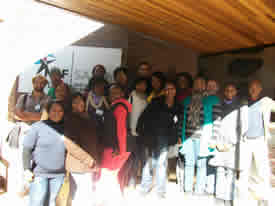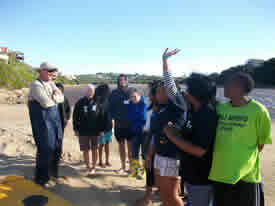| 91% of readers strongly agree that social media platforms could play a key role in attracting younger generations of South Africans to SET fields of study. | |
| 3% say they are not sure (too many learners still don’t have internet access). | |
| 6% disagree (the time and money could be better spent on outreach projects). |
It’s like a real-life movie ... Scientists plan to smash a spacecraft into an asteroid - so they are prepared for the possibility they will have to stop one hurtling towards Earth. The news came as Nasa moved to calm fears that a comet is on a collision course with our planet. Read more
OUT AND ABOUT
Experiencing science first-hand inspires students
By Siphokazi Nonyukela
 |
SAIAB’s 2011 Winter School students. |
|
 |
SAIAB’s Principal Aquatic Biologist, Dr Paul Cowley (left) with Winter School students at the Kleinemonde estuary, providing insight into collecting sample fish species. |
|
 |
Winter School students prepare a net to collect samples of fish species. |
|
In theory, practice is simple. But, is it simple to practice theory? Students attending the South African Institute for Aquatic Biodiversity’s (SAIAB) 2011 Aquatic Biodiversity Course were introduced to some of the best aquatic scientists, nationally and internationally, and together explored theory and practice and its relation to the aquatic environment.
SAIAB usually targets the annual Aquatic Biodiversity Course - also known as the SAIAB Winter School - at postgraduate students. This year, however, it focused on undergraduate students, exposing them to diverse career paths within the aquatic environment in order to help them make informed choices about the areas they would like to pursue for postgraduate studies. Attendees represented Rhodes University (RU), University of KwaZulu-Natal (UKZN), Walter Sisulu University (WSU) and Nelson Mandela Metropolitan University (NMMU). Four DST/NRF interns based at SAIAB also attended.
The four-day course introduced participants to biological diversity, taxonomy and systematics in freshwater. They took part in lectures, practical sessions and workshops, as well as conducting fieldwork on estuarine and marine environments. They were given basic information on how to use the specialist Margaret Smith Library and the Collections Management Centre, including preservation and storage techniques. They were also shown how to manage biodiversity information through Geographic Information Systems and databases.
On the final day of the course students attended an interactive workshop on science communication, which highlighted the critical role of communication in developing public awareness of science.
While presenting a lecture in estuarine ichthyology, SAIAB’s Chief Scientist Professor Alan Whitfield encouraged the students to identify a research project that interests them. He emphasised that you do not have to be a top scholar to become a marine biologist, but should rather make progress and enjoy the project you are involved in so that you can become successful and eventually attain high marks.
For most students, the highlight of the course was the fieldtrip, as it demonstrated what scientists do in the field and the process of collecting samples of fish species.
“Through this field trip I have learned about the importance of estuaries and that they need to be conserved for human sustainability,” says Peet Botes, BTech student from NMMU George Campus.
Nkoliso Magona, a third-year biological sciences student from WSU, had never been to an estuary to collect fish before. This course provided him with the opportunity to see first-hand how science actually happens in the field.
Aviwe Matiwane, another third-year student from WSU, enjoyed the session on systematics and taxonomy the most. “It was challenging but fun, especially identifying fish fossils,” she says.
SAIAB is in the process of establishing an Aquatic Biodiversity Student Network for students throughout South Africa who are involved in aquatic biodiversity studies. Winter school students were encouraged to join this network.
Refiloe Mofokeng, an MSc zoology student specialising in eco-toxicity at UKZN, describes her experience at the winter school as “amazing”.
“I got a lot of information and made contact with researchers who I have always aspired to meet,” she says.” The experience allowed me to see where South African scientists stand in relation to other international scientists, which was helpful for my research. It was also a good form of networking because I received advice on my current research project. The activities were fun, innovative, challenging and informative.”
